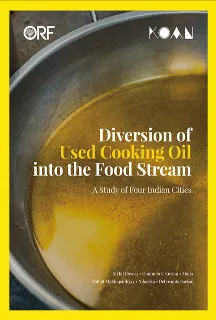Executive Summary
Introduction
With India’s per capita edible oil consumption nearly doubling in the last decade, so has its generation of Used Cooking Oil (UCO). UCO is the leftover oil from frying and cooking that is produced both in homes and in commercial food manufacturing and service businesses. Repeated use of UCO has been linked by extensive scientific and medical research to a number of non-communicable diseases, including cancer, heart disease, and organ damage. Consumption of UCO in any form is regulated in many countries, including India, due to its adverse health impact. However, through home and commercial reuse, almost 60 percent of the UCO produced in India makes its way back into the food chain.
The Repurpose Used Cooking Oil (RUCO) initiative was started by India’s food-safety regulator, the Food and Safety Standards Authority of India (FSSAI), to combat the growing diversion of UCO back into food supply. The goal is to develop a legal and regulatory framework to shift UCO away from the food chain and towards other waste-to-wealth industries including bio-fuels, soaps, and oleo-chemicals. However, this initiative has had limited impact due to policy gaps like those that allow topping up UCO with fresh edible oils, compounded by low levels of societal awareness, poor compliance among UCO generators, and ineffective ground-level implementation by the FSSAI and state-level food safety authorities.
Objectives of the Study
The present study looks to fill the gaps in literature that explore the public health impacts of UCO consumption in India by examining the extent, trends and processes through which UCO is diverted into the commercial food stream. By examining the behavioural practices of food business operators (FBOs) across four Indian metros—Delhi, Mumbai, Kolkata, and Chennai—the study focuses on the following trends:
- Edible oil consumption by type and location of FBOs;
- UCO generation by type and location of FBOs;
- UCO consumption by type and location of FBOs;
- UCO disposal by type and location of FBOs; and
- Awareness of food safety laws and the RUCO initiative by type and location of the FBOs.
The study also looks into how changes in the prices of edible oils, awareness levels of FBOs, and development of waste collection infrastructure, affect compliance with food safety guidelines and regulations of the RUCO initiative.
Methodology
The study employs a mixed-methods approach, combining an extensive literature review, expert and stakeholder interviews, and statistical and econometric analysis of primary data to examine the landscape of commercial UCO generation, consumption, and diversion into the food stream. It surveys 507 (101 large and 406 small) FBOs across four metros in India—i.e., Mumbai, Delhi, Chennai, and Kolkata.
Results
The study seeks to fill current knowledge gaps in identifying UCO consumers and producers among FBOs in India, estimating the volumes of UCO consumption among these businesses, pinpointing the drivers of UCO sale and consumption, and the impact of state regulation and enforcement on the ecosystem. The following are key findings of the survey:
- Smaller eateries buy cheaper cooking oils but spend more on oils as a percentage of their costs: In comparison to large restaurants, small eateries typically pay far less for their cooking oil purchases. Thus, small restaurants are more likely to buy cooking oils of poor quality or sold ‘loose’ (not packaged), which may be mixed with UCO. Smaller restaurants in cities spend, on average, 15 to 25 percent of their daily budget on cooking oils.
- Large eateries under-report volumes of UCO generation: Out of a total of 101 large restaurants surveyed, all but eight reported daily UCO generation below 10 litres. With 70 percent of the large eateries’ total daily consumption of cooking oil exceeding 50 litres, it is possible that some of them are grossly under-reporting their UCO generation. (The FSSAI guidelines are only applicable to FBOs consuming more than 50 litres of cooking oil per day.)
- Eateries continue to reuse UCO till the last drop: The majority of large eateries across the four cities self-reported that cooking oil for frying was changed daily. However, among small eateries, especially in Delhi and Kolkata, respondents claimed that they cooked with UCO till the last drop. Similarly, respondents in Mumbai and Chennai claimed low volumes of leftover UCO, indicating a high prevalence of UCO self-utilisation.
- UCO disposal is a challenge for large eateries: Among large eateries in Delhi, Mumbai, and Kolkata, 53 percent claimed that they dispose of UCO in drains. This figure is significantly lower for Chennai where a larger proportion of eateries sell UCO to accredited collectors and aggregators. This claim of UCO being disposed of in drains has been challenged by experts and stakeholders who argue that it is a cover-up for continued UCO utilisation as well as resale to unauthorised traders, and the volume discarded in drains is minimal. Small eateries do not face any issues disposing of UCO since they acknowledge that they reuse their cooking oils till the last drop.
- Price incentives drive UCO sale: Eateries, especially in Chennai, reported that better prices were the key drivers for not reusing UCO and selling the waste oils to aggregators and collectors.
- Infrastructural support by local government bodies helps in UCO collection: Chennai’s local government bodies assist eateries in storage and disposal of UCO. There is no such support in the other three cities. This has led to more eateries in Chennai segregating and selling UCO to designated collectors and aggregators, helping ensure that UCO is removed from the food stream.
- Awareness of regulations drives better compliance: Awareness of the RUCO initiative is low, with the exception of respondents in Chennai. Chennai had a larger proportion of large and small eateries that do not reuse UCO and dispose of it through designated collectors and aggregators. Awareness of food safety rules is even lower across small eateries than large ones, especially in Delhi and Kolkata. Small eateries freely reutilise UCO in their cooking. The linear regression model devised for this study indicates that for both large and small eateries, higher levels of awareness will reduce the likelihood of them reusing cooking oil by as much as 98 percent.
Policy Recommendations
India can do a lot more to address the challenge of UCO diversion into the food stream. The strategy will need a combined effort by all stakeholders including the government and the FBO sector, networks of doctors and nutritionists, as well as consumer rights groups. This report makes the following policy recommendations:
- Harmonise UCO regulations: The practice of topping up UCO with fresh oil, allowed by the FSSAI so far due to implementation capacity gaps, needs to be stopped. The guidelines should be expanded to account for all possible avenues through which UCO could re-enter the food stream, including animal feed and household consumption. The FSSAI should also explore the feasibility of expanding RUCO compliance to eateries consuming less than 50 litres of oil per day.
- Improve enforcement capabilities: State-level food safety authorities that enforce UCO management rules are often short on personnel, ill-equipped, and poorly funded. The FSSAI must build institutional capacity from the ground up.
- Promote awareness about the health impacts of UCO reuse: The FSSAI needs to engage with other critical stakeholders in the ecosystem, including food industry associations, consumer groups, industry bodies, public health experts, doctors and nutritionists, to launch impactful and persistent awareness campaigns targeting FBOs. It needs to run awareness campaigns for consumers highlighting the risks of UCO consumption while providing actionable inputs on UCO disposal at the household level.
- Improve industry self-regulation: Stakeholders of the food manufacturing and services industries need to take on a more proactive role in ensuring compliance with food safety standards and regulations of their constituent members.
- Develop infrastructure for UCO collection: This present survey showed that compliance depends upon the presence of supporting infrastructure, including serviceability and access to UCO collectors and aggregators. The FSSAI can leverage the efficiency of the private sector as well as drive greater public-private collaboration with local self-government bodies to improve the physical infrastructure for UCO storage, collection, and disposal.
- Promote principles of circular economy: Since UCO has significant demand from non-food sectors including bio-fuels, soap and oleo-chemicals, there is scope to create an alternative structure to divert UCO out of the food stream through a market-driven incentive system. This will help drive circular-economy principles while also delivering positive health outcomes.
Introduction
India’s consumption of edible oils has grown in recent years, alongside its overall consumption growth. Other factors have also driven the rise, including urbanisation, changes in tastes and preferences, and rising purchasing power largely attributed to per capita income growth. Various studies have found evidence of these patterns, including one in 2015 by the Observer Research Foundation (ORF).[1]
Over the past five years, though India’s production of edible oilseeds has increased by more than 44 percent, it barely meets 40 percent of the country’s demand. The annual consumption demand for edible oil is 25 million tonnes, of which 60 percent comes from households and 40 percent from the commercial sector (i.e., food manufacturing, hotels, restaurants, and other entities that serve food—together known as food business operators or FBOs).[2] Of the 25 million tonnes, only 10.5 million tonnes come from domestic production.[3] The remaining 58 percent is imported, of which 86 percent consists of palm oil and soya oil. This high import dependence translates to high volatility in prices of edible oils in the domestic market, which rose to an 11-year high in early 2021 following disruptions in global edible oil supplies.[4]
With the rise in consumption of edible oils from 11.2 litres per capita in 2005-06 to 19.5 litres in 2015-16, there has been a corresponding increase in the generation of used cooking oil (UCO).[5] UCO is classified as waste edible fats and oils of animal or vegetable origin, which is the residual by-product of cooking food, particularly frying at higher temperatures.[6] The primary generators of UCO are households and FBOs.
There is overwhelming evidence that repeated consumption of UCO increases the risk of contracting many non-communicable diseases, including cancers and cardiovascular diseases, and can lead to organ damage.[7],[8] Yet, 60 percent of the UCO generated in India finds its way back into the food stream through domestic and commercial reuse.[9]
In 2018, India’s food safety regulator, the Food Safety and Standards Authority of India (FSSAI) issued guidelines seeking safety standards for edible oil use and UCO disposal. Subsequently, the Repurpose Used Cooking Oil (RUCO) initiative was launched in 2018 to create a regulatory mechanism to promote sustainable and non-hazardous disposal of UCO into biodiesel manufacturing. More recently, the ambit of the RUCO initiative has been expanded to include disposal of UCO by using it in the manufacture of soap and lubricants as well.[10] The initiative also launched a number of public awareness campaigns about the health risks of consuming UCO and appropriate disposal methods. These initiatives are premised on the fact that UCO could be better diverted to other sectors—such as biodiesels and oleo-chemicals—and could thereby promote principles of circular economy and sustainability instead of negatively impacting public health. However, the initiative has fallen short of its goals: societal awareness remains low, there is poor ground-level implementation, and UCO generators often do not comply.
Though the FSSAI rules came into force on 1 July 2018, compliance levels across the food manufacturing and business sectors have been low.[11] Additionally, since the regulations of the RUCO initiative only apply to FBOs that consume more than 50 litres of edible oil per day, a large majority of small food business operators escape any regulatory oversight.[12] Consequently, waste oil generated in the commercial sector finds its way back into the food stream through reuse, or is sold to roadside food vendors. According to media reports,[13] pricing plays an important role in reinforcing the “substitution effect”, with loose UCOs sold at a much lower price than branded and packaged edible oils.
While there are existing studies establishing the health risks of UCO consumption, these have critical gaps in understanding the full scope of the challenge in India. For instance, while the studies have documented the various genotoxic and carcinogenic risks associated with UCO consumption, they do not explain the socio-economic dynamics of UCO consumption, nor the environmental challenges, public-health outcomes, and impact on health expenditure and productivity of communities.[14]
This study is an attempt to fill the knowledge gap, from a commercial perspective, on how UCO gets diverted into the food stream. It does not engage with the issue of UCO consumption at the household level. It examines edible oil consumption and UCO generation practices of commercial food service establishments across four cities in India—i.e., Delhi, Mumbai, Kolkata, and Chennai. The results will provide greater clarity on UCO generation and management at the commercial level, identify triggers for reuse of UCO in commercial food preparation, and offer lessons that can help enhance policy and improve the regulatory and enforcement regime for UCO management in the country.
Methodology of the Study
The report has four sections. Following the Introduction, Section II examines existing literature on the health implications of UCO consumption. Section III outlines the global and national trends in UCO consumption as well as the overall UCO ecosystem, and most importantly, attempts to identify global best practices in UCO management and repurposing. Section IV presents the findings of a quantitative and qualitative analysis of the patterns and triggers of commercial UCO generation, consumption and disposal across the four metros. It also presents results from interviews with medical and nutrition professionals. The report concludes with a set of recommendations towards better management of the UCO ecosystem in India, particularly in commercial establishments.
The first step was identifying existing gaps in the literature on UCO consumption and management in India. The authors referred to academic literature, media reports, and consumer knowledge products such as press releases, advertisements, and pamphlets. Once the gaps were identified, a primary survey was designed to enable a quantitative and qualitative analysis of the UCO ecosystem in India. The primary survey consisted of two phases: a structured survey across the four metro cities,[15] and interviews with medical practitioners and nutritionists.
The first phase of the primary survey entailed interviews based on a structured questionnaire administered to proprietors of 507 commercial FBOs across the four cities. The questionnaire sought to fill current knowledge gaps in identifying UCO consumers and producers among FBOs, their volume of UCO consumption, the drivers of UCO sale and consumption, and the impact of state regulation and enforcement on the ecosystem. The sample was drawn from two segments: large eateries, comprising dine-in restaurants, quick-service restaurants, canteens in commercial establishments, and marriage and banquet halls with more than 50 litres of average daily consumption of cooking oil; and small eateries, such as roadside eateries, food carts, and fritters stalls. Using descriptive statistics and econometric methods, the study tries to understand the associative and causal relationships between variables impacting UCO reuse, sales, and compliance with regulations. The study also maps the spatial divergences of FBO behavioural practices across the four cities.
The second phase involved a series of expert interviews with 32 doctors and nutritionists to estimate levels of awareness and knowledge about UCO consumption and its ill-effects among patients and the scientific community.
While the research team exerted their best efforts to ensure the quality and robustness of the methods of analysis, the study admits to the following limitations:
- It does not attempt to map the complete UCO supply chain in India.
- While it discusses, to some extent, the health implications of UCO consumption and how it could worsen the country’s disease burden, it does not specifically examine household-level UCO consumption.
- Most of the questions posed to the commercial establishments in the first phase of the survey, particularly those related to the operations of UCO markets, are about practices that are legally disallowed, but which nonetheless continue. The responses thus needed to be contextualised while reporting them.
- Both phases of the survey were conducted while the COVID-19 pandemic was still causing high numbers of infections across the country; the research team admits to operational difficulties in the study.
Read the entire report here.
[1]Nilanjan Ghosh et al., “India’s FTAs with East and Southeast Asia: Impact of India-Malaysia CECA on the Edible Oil Value Chain,” Observer Research Foundation Occasional Paper No. 73, October 6, 2015.
[2]Repurpose Used Cooking Oil, FSSAI.
[3]Shubham Shankhdhar, “Why edible oil prices are on fire,” India Today, June 16, 2021.
[4]Harikishan Sharma, ‘‘Concerned’ as edible oil prices soar to 11-year high, government takes stock,” The Indian Express, May 26, 2021.
[5]“Buying of Palm Oil from Malaysia,” Ministry of Commerce &Industry, Press Information Bureau, February 7, 2020.
[6]Ministry of Environment, Forest and Climate Change, Government of India, April 4, 2016.
[7] “Recycled Cooking Oils: Assessment of Risks for Public Health,” Europarl, September 2000.
[8]Guy Crosby, “Do Cooking Oils Present a Health Risk?,” IFT, May 1, 2018.
[9]Repurpose Used Cooking Oil, FSSAI.
[10]“Standard Operating Procedure on Regulatory Action against Malpractices in Disposal of Used Cooking Oil,” FSSAI, January 27, 2022.
[11] Anila Kurian, “Cooking Oil Reuse to be Tracked,” Deccan Herald, February 20, 2019.
[12] TNN, “1 in 10 street food vendors in Tamil Nadu reuses cooking oil,” The Times of India, June 26, 2022.
[13]Kanchan Srivastava, “Used Cooking Oil in India diverted to food chain ; Public Health and Biodiesel Sectors suffer,” EarthJournalism Network, August 12, 2021.
[14]Rekhadevi Perumalla Venkata and Rajagopal Subramanyam, “Evaluation of the deleterious health effects of consumption of repeatedly heated vegetable oil,” Toxicology Reports, (2016), 636-643.
[15]The primary survey was conducted by Impetus Research in the form face-to-face (F2F) pen-and-paper personal interviews (PAPI) across 4 different cities in the first quarter of year 2022.
The views expressed above belong to the author(s). ORF research and analyses now available on Telegram! Click here to access our curated content — blogs, longforms and interviews.

 PDF Download
PDF Download



 PREV
PREV







